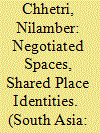| Srl | Item |
| 1 |
ID:
178155


|
|
|
|
|
| Summary/Abstract |
Succeeding waves of mobilisation for the separate state of Gorkhaland has left an indelible imprint on the cultural, political and urban landscape of the Darjeeling Hills. Based on empirical research, this paper tries to explore the intricate relationship between ethnicity, place and politics of belonging in the Himalayan town of Kalimpong. It specifically tries to locate the interface between political events and the transformation of the urban landscape by taking into consideration the growth of roadside settlements. While noting the specific contours of these settlements, their culture and their liminal condition, the paper tries to address the issues pertaining to place-making and identity formation in the Himalayan region.
|
|
|
|
|
|
|
|
|
|
|
|
|
|
|
|
| 2 |
ID:
152998


|
|
|
|
|
| Summary/Abstract |
This article is an empirical investigation into the recent demands made by ethnic groups for recognition as scheduled tribes (ST) in Darjeeling. These demands emerged in the early 1990s after the publication of the Mandal Commission Report and escalated in subsequent years. During the course of this study in 2014 there were 10 ethnic groups demanding recognition as ST. In recent years the developmental strategy adopted by the state government through the constitution of development boards for groups such as Lepcha, Tamang, Sherpa, and Bhutia has caused further escalation of these demands. Discussing these multifarious issues in Darjeeling, this article traces the historical legacy of these demands and discusses in detail formation of ethnic associations and their claims in recent time. Examining the interactions between ethnic associations and government agencies, this article will provide an empirical account of ethnic politics in Darjeeling and the response of the state in containing such demands made by ethnic minorities.
|
|
|
|
|
|
|
|
|
|
|
|
|
|
|
|